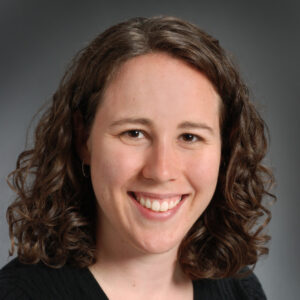This month, we shine our spotlight on one of our newest volunteers, Patricia K. Marik, PsyD. She is a Pediatric Psychologist at Children’s Hospital of Wisconsin and an Assistant Professor in the Division of Pediatric Psychology and Developmental Medicine at the Medical College of Wisconsin. Dr. Marik joined the National Foundation for Ectodermal Dysplasias (NFED) Scientific Advisory Council (SAC) earlier this year.
Dr. Marik provides psychology services on the multidisciplinary Cleft Lip and Palate Team and to patients in the Craniofacial Clinic. She helps her patients with everything from teasing and bullying to surgical decision making. The Xavier University graduate also does in-patient consultation, helping patients and families cope with trauma, illness and being hospitalized.
When she’s not helping kiddos with their emotional health, she loves to run and read a great book – everything from chick lit to serious topics. But her favorite thing is being an aunt to her three nephews and one niece.
The NFED is thrilled to have a professional with Dr. Marik’s interests and expertise on the SAC to help us better serve the emotional health of our community. We sat down with Dr. Marik at her first NFED Family Conference in Colorado in July to learn more about her and why she joined our NFED family.
Why did you decide to join the NFED SAC?
I love the idea of an organization that is centered around families. So often, I’m surrounded by professionals and we can learn so much more from families. I love that this organization keeps the patient and the family in the center of things. And it seems like everything is in the service of the patient. It absolutely comes through in all of your materials and in the Family Conference.
There’s so much for families to learn from other families, and sometimes the professionals have to get out of the way and let the families educate each other. And we have to learn from the families.
I’m learning as much here at this conference as I’m giving, probably more.
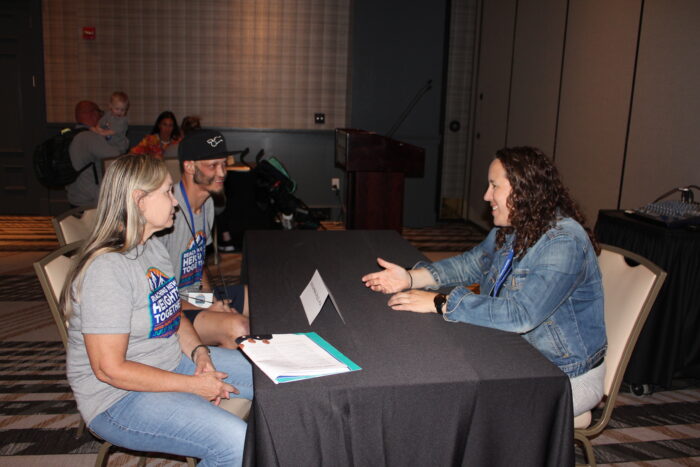
What do you aspire to do to help families affected by ectodermal dysplasias?
The whole concept of family first is asking families what education would be helpful to them. What materials would be helpful? What support structure would be helpful and then using families’ expertise, their lived experience, and my clinical expertise and putting those things together. So, I don’t necessarily have an agenda yet.
I would love to hear from families about what they wish we had or what they feel like are their biggest difficulties right now. And then we can decide what resources, webinars, talks at future Family Conferences or whatever it is, we can develop to specifically target those things. That’s really what I hope to do.
Do you find that your clinical approach is different when you are treating children and families when they have a medical or chronic condition?
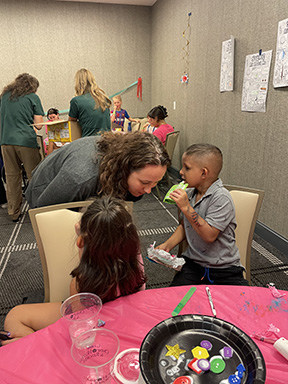
My approach is really informed by whatever history I know. Whether it’s a psychiatric history or a medical history, or both, or a trauma history, whatever it is, I try to have flexibility in my approach to meeting patients or families where they are and informed by their experiences.
What’s your favorite thing to do within your career?
I love hearing about typical kid and teenage stuff! I love when my patients show me their prom pictures or when we celebrate their driver’s license. My role as a psychologist who works with kids and their families in dealing with medical conditions is to help them have as typical a life as possible.
I like therapy sessions where we’re talking about important stuff. But I also like the therapy sessions where it is, “I’m going to tell you about my roommate drama in college”, because that’s typical. And I like talking about the typical things because kids are oftentimes so medicalized and everything is about their health condition, but they’re still kids or they’re still teenagers. And I love when they’re snarky with me. I love when that typical teenager stuff happens because it means I’m doing my job right and the entire medical team is doing their job right and they are able to have these really typical experiences.
You specialize in pediatrics but are still able to help our adults at the NFED, too, right?
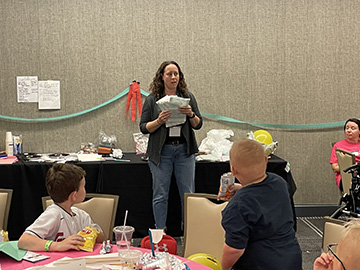
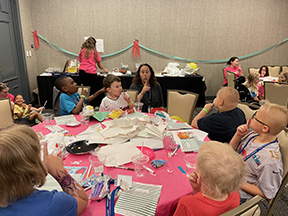
Yes, I am trained as a generalist, so I’m trained to treat all. Something else that really excites me about the NFED is that it serves the whole lifespan. One of the biggest points of fear I hear from my patients as they’re becoming adults is, “What now?” They’re losing their pediatric healthcare system, where they’re safe, where they know their way around, where they’re taken care of, where everybody knows them. I enjoy shepherding adolescents through the transition to adulthood.
Adults don’t need everything that kids need and kids don’t need everything adults need. But the more that we can support them through the lifespan, the better. You don’t stop having ectodermal dysplasia at 18 or at 21. That’s something that really excites me – how do we support them through their lifespan?
It’s great news for kids knowing that the support structure of NFED still exists when they are on their own, when they are going to their first doctor’s appointments alone or trying to figure out their insurance plan as an adult for the first time. I love that I can say, there’s this group that’s going to help you through that. That’s really important. I love that!
Do you have emotional well-being topics or resources you would like to see NFED offer? Tell us in the comments below! We will share the ideas with Dr. Marik and consider in our planning.
